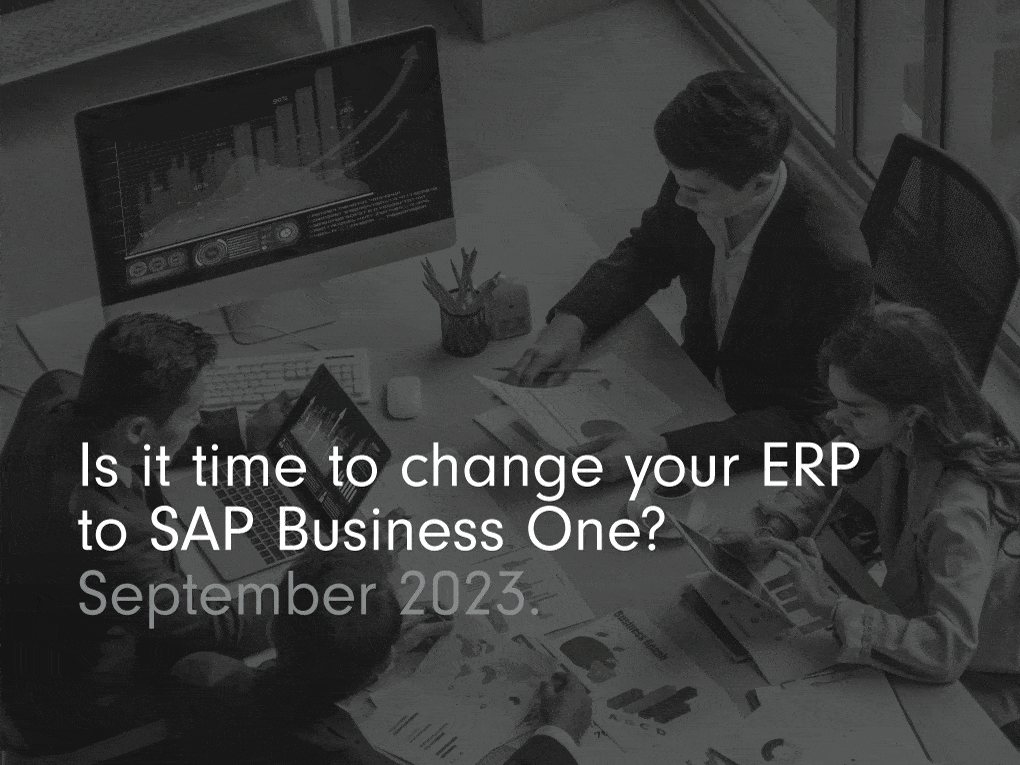Is it time to change your ERP to SAP Business One?

An ERP – or Enterprise Resource Planning system – is a business management application. Running across your entire company and working on a single database, it automates and streamlines your processes.
An ERP provides a single, real-time view of your organisation and can be used by staff from across the business to access accurate data about sales, customers, stock, finance and more.
By enhancing efficiency, productivity and accuracy and by improving insight into business performance, an ERP is invaluable in helping companies to grow.
Without a robust and comprehensive modern system, you could find yourself hindered by inefficiencies that can stifle your growth and lead to costly mistakes.
Here are some of the signs it is time to change your ERP to SAP Business One.
Hampered growth and lack of scalability.
If your current system can’t keep up with the pace your business is growing, or if it’s too rigid to adapt to changes, it’s a sign you need a more scalable solution like SAP Business One.
Older systems may not be equipped to handle increased transaction volumes or additional modules. This could seriously impede your ability to grow or adapt to market changes.
By implementing a new ERP system, you can easily scale your business by adding user licences or new modules that provide additional functionality.
Poor user experience.
If your team finds your current system clunky and non-intuitive, it will affect their efficiency. A poor interface or usability experience may see your staff spending extra time to find what they need, to manually create reports or to extract figures.
Modern ERPs are designed with the user in mind. As user requirements develop, platforms like SAP Business One have evolved to meet those modern needs and expectations.
Data inaccuracies and inconsistencies.

If you’re frequently encountering errors and you have an increasing lack of trust in the data provided by your current system, it’s a sign that you need to switch to a more reliable and accurate system.
If you use disparate systems or multiple spreadsheets to handle different aspects of your business, you could end up with inconsistent and conflicting data. This can make it difficult to get an accurate picture of your operations, leading to poor decision-making.
SAP Business One consolidates all your business functions into a single, unified system that runs on a centralised database. This ensures that everyone in your organisation is working with the same information, which eliminates data disparities and errors.
Limited real-time visibility.
Lacking an integrated view of all business functions can lead to poor visibility across departments. A limited insight can hamper your ability to make quick, informed decisions, affecting your competitive edge.
With an ERP system upgrade to SAP Business One, you’ll have a comprehensive dashboard and analytics tool that provides real-time visibility across all your departments and business entities. Data from across the business is automatically updated and made accessible in real time, enabling you to take swift and informed decisions that can enhance your competitive edge.
Lack of customisation and flexibility.
If your current ERP system lacks the flexibility to adapt to your specific business needs or processes, you may need a more customisable solution. Customisation is key in ensuring your ERP system can grow and change as your business evolves.
If you cannot easily customise your current system, you could be missing out on opportunities for operational efficiency and may struggle to effectively implement new business strategies.
SAP Business One allows for extensive customisation. It supports a wide range of third-party add-ons and you can adapt it to meet your industry-specific requirements. Reports, dashboards, screens and inputs can all be tailored so that they closely align with your unique business requirements.
Vendor and support issues.

If the vendor of your existing ERP system is no longer offering adequate support or has announced that your current version will no longer be supported, it may be time for an ERP upgrade.
With SAP Business One, you can expect long-term support and development from a company that has been a leader in the enterprise software industry for decades. SAP’s established reputation for quality and innovation makes it a reliable choice for companies looking for a lasting partnership.
Outdated technology.
As technology evolves, older systems can become obsolete, lacking the modern features that have become industry standard. Your current system, for example, may not provide mobile access, cloud hosting or advanced backup and security measures.
Staying compliant with industry regulations is also crucial in many sectors. If your existing system doesn’t support the latest legislation or is lacking in its compliance management, it could expose your business to legal risks.
SAP Business One provides an up-to-date platform with all the modern functionality you expect. And with SAP’s commitment to ongoing research and development, you can be assured that the software will always provide the latest features, regulatory compliance and security measures.
Complex requirements.
If your business has evolved to have more complex requirements – such as multinational operations, intricate supply chain management or advanced financial reporting – your current ERP system may no longer be sufficient.
Legacy systems can be limited in their ability to handle multi-currency transactions, work in multiple languages, manage global taxation regulations or integrate with emerging technologies. A system with inadequacies like this can put you at a competitive disadvantage and introduce operational risks.
SAP Business One is designed to handle the multifaceted requirements of modern organisations It offers advanced features that can seamlessly manage any complexity in your operations, reporting and global business management.
Integration issues.

A lack of seamless integration with other key supply chain solutions, like CRM, ecommerce platforms or warehousing software can create problems.
With poor integration, you might suffer delays in transferring data between your systems. This could affect time-sensitive operations, like order processing, stock management and financial reporting.
If your teams run different databases, a lack of integration puts your different departments at risk of working in isolation, which could mean they are reliant on fragmented or outdated data.
SAP Business One offers robust integration capabilities, ensuring seamless communication between your various third-party applications. Its API-driven architecture and out-of-the-box connectors ensure that data flows smoothly across all your systems, eliminating silos and enhancing operational efficiency.
Inadequate reporting and analysis.
An older system might be limited in its reporting and data analysis. If you’re struggling to generate real-time reports or are unable to customise them to your needs, it’s time to look for a system that offers robust analytics and reporting features.
SAP Business One features built-in analytics and reporting tools that enable real-time data monitoring and insights. Using its intuitive dashboards and customisable reports, you can easily track KPIs, assess your financial performance and make data-driven decisions as situations change.
Take action now and make SAP Business One your next step.
Do you recognise any of these signs in your business? If so, it is time to undertake an ERP audit. Switching to SAP Business One will help mitigate the risks presented by your current software and will provide you with the tools you need to manage your growing business effectively and profitably.
SAP Business One offers the flexibility, scalability and advanced features that modern businesses require to stay ahead of the competition. By recognising these signs early, you can make the transition in a timely manner, avoiding many of the pitfalls that come with sticking to an outdated system.
For more information about implementing SAP Business One as your new ERP system, call us on 020 8819 9071 or get in touch.